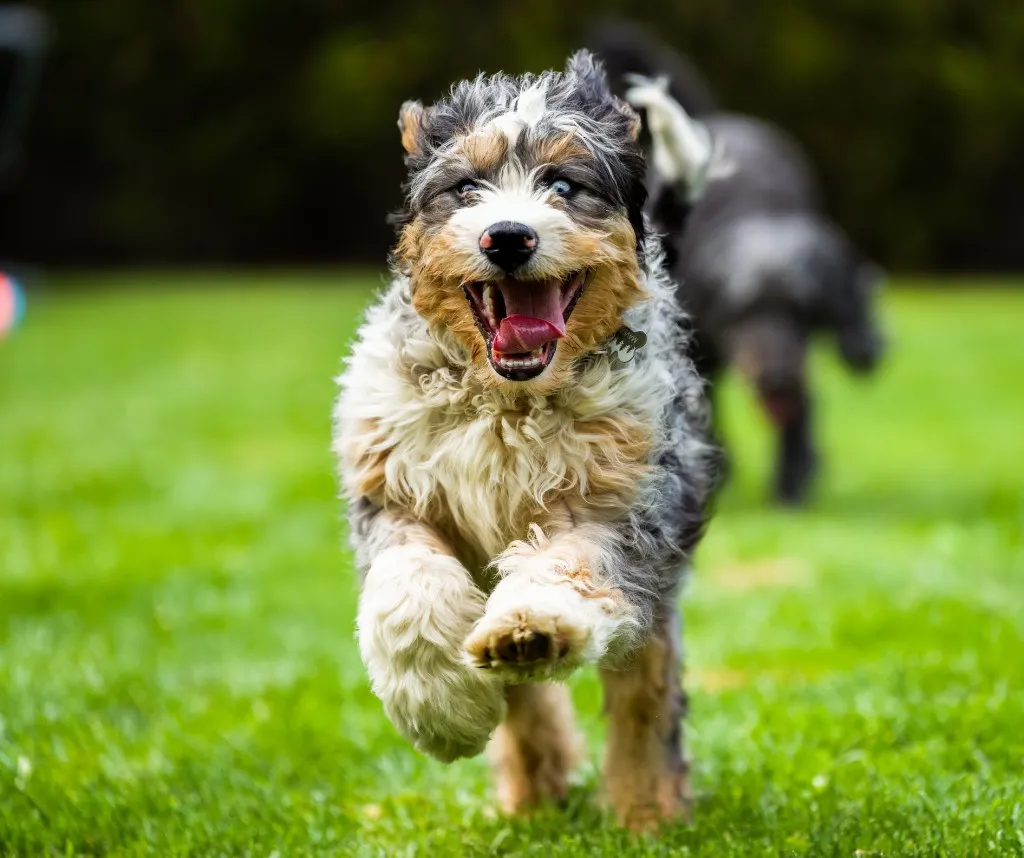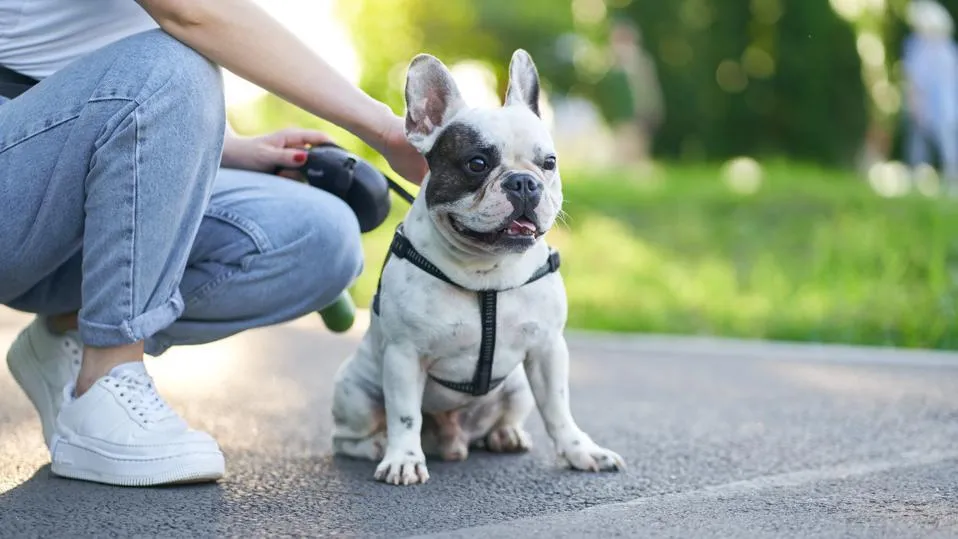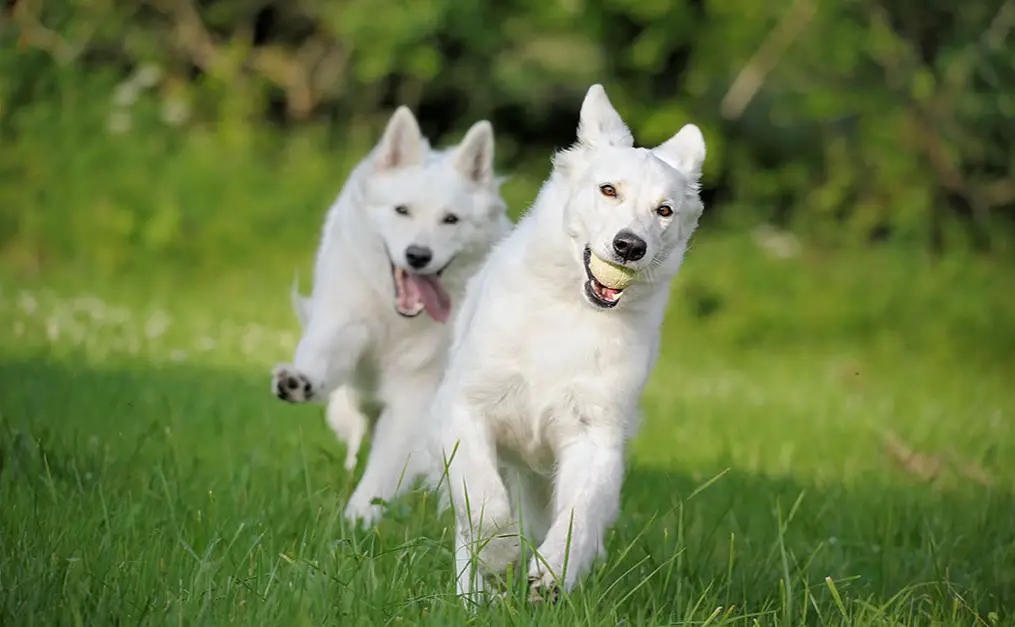The Mini Bernedoodle is a charming hybrid breed that combines the intelligence of the Poodle with the loyal and affectionate nature of the Bernese Mountain Dog.
These adorable pups have quickly become a popular choice for families looking for a smart, playful, and low-shedding companion.
If you’re considering adding one of these fluffy bundles of joy to your home, here’s everything you need to know about the Mini Bernedoodle.
A Perfect Blend of Two Beloved Breeds
Mini Bernedoodles inherit the best traits from both parent breeds:
- The Poodle contributes intelligence, trainability, and a hypoallergenic coat
- The Bernese Mountain Dog brings loyalty, affection, and a gentle temperament
This combination results in a dog that’s not only adorable but also well-suited for various living situations and families.
Size and Appearance
As their name suggests, Mini Bernedoodles are smaller than standard Bernedoodles.
They typically stand 18-22 inches tall at the shoulder and weigh between 25-50 pounds.
Their size makes them a great option for those living in apartments or smaller homes.
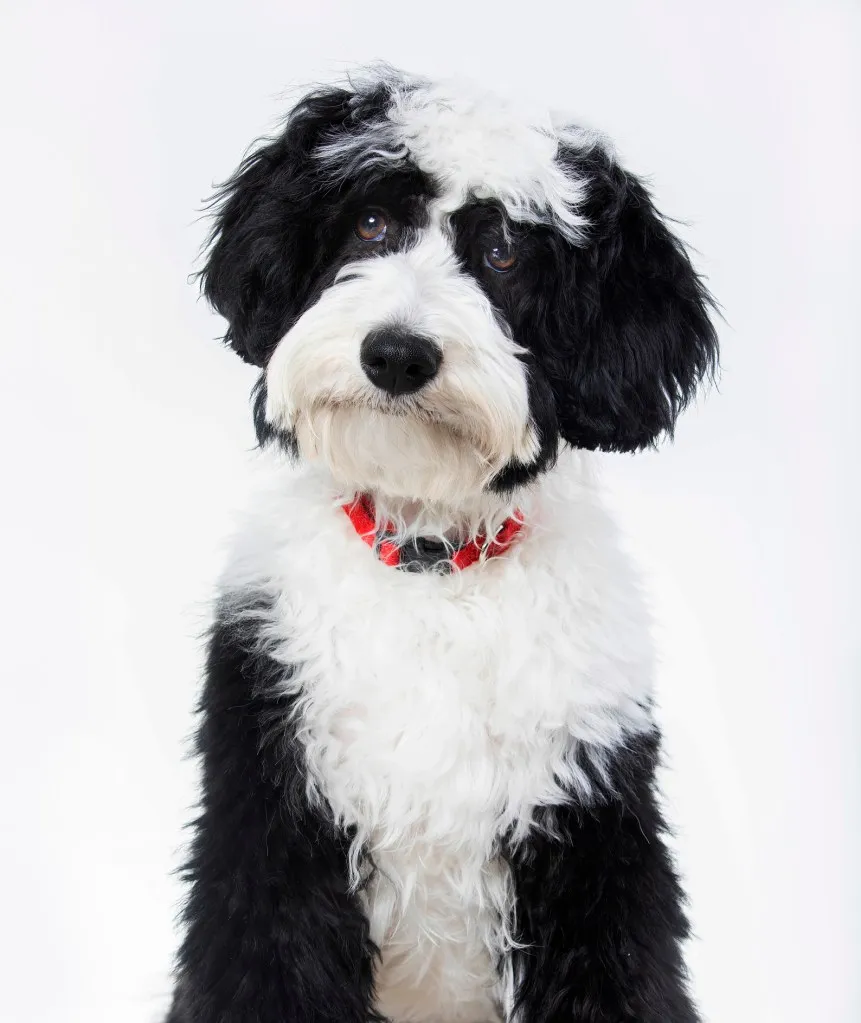
Mini Bernedoodle sitting
Their coats can vary in texture and color, but they often have wavy or curly fur that’s soft to the touch. Common colors include:
- Black
- Brown
- White
- Tri-color (black, brown, and white)
Personality and Temperament
Mini Bernedoodles are known for their friendly and playful nature.
They inherit the Poodle’s intelligence and the Bernese Mountain Dog’s gentle disposition, making them excellent family pets.
Here are some key traits:
- Affectionate: They love to cuddle and be close to their humans
- Intelligent: Quick learners who excel in training
- Energetic: Require regular exercise and mental stimulation
- Social: Generally good with children and other pets
- Loyal: Form strong bonds with their families
It’s important to note that every dog is an individual, and temperaments can vary.
Early socialization and consistent training are crucial for developing a well-rounded Mini Bernedoodle.
Exercise and Activity Needs
While Mini Bernedoodles are adaptable to different living situations, they do require regular exercise to stay happy and healthy.
Aim for at least 30-60 minutes of physical activity daily, which can include:
- Walks
- Playtime in a fenced yard
- Fetch or frisbee
- Swimming (if they enjoy water)
- Agility or obedience training
Mental stimulation is just as important as physical exercise for these intelligent pups.
Puzzle toys, training sessions, and interactive games can help keep their minds sharp and prevent boredom-related behaviors.
Grooming and Care
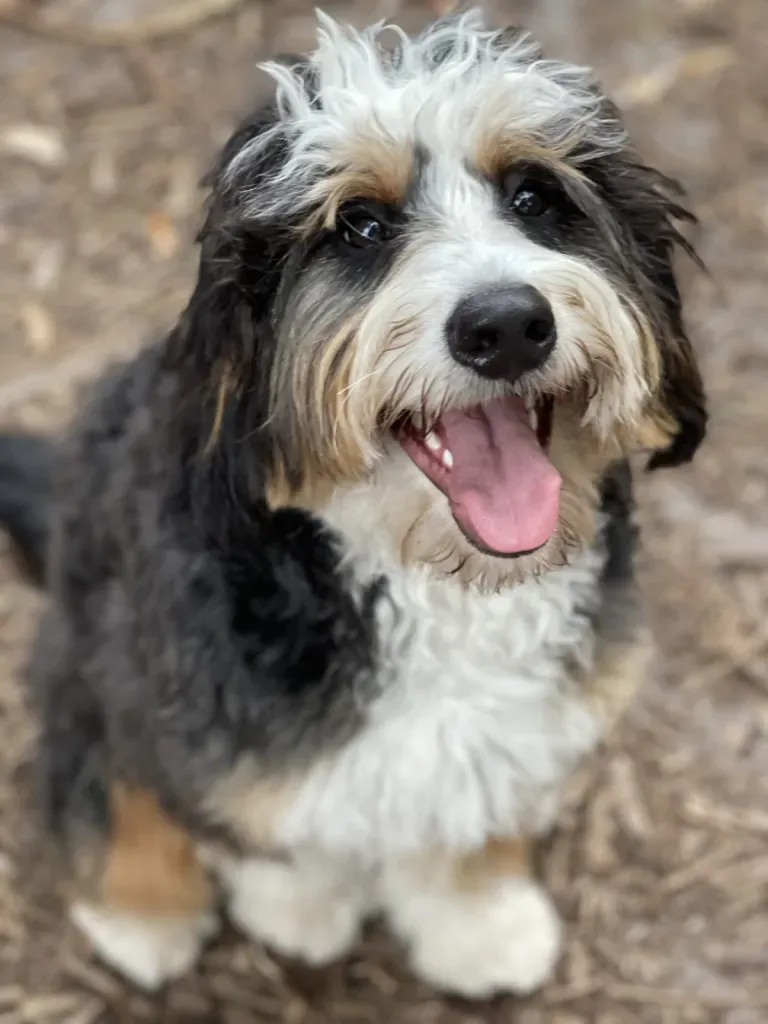
Mini bernedoodle smiling
One of the main attractions of the Mini Bernedoodle is their low-shedding coat, which is often described as hypoallergenic.
However, this doesn’t mean they’re maintenance-free. Regular grooming is essential to keep their coat healthy and mat-free:
- Brush 2-3 times per week (daily during shedding seasons)
- Bathe every 4-6 weeks or as needed
- Trim nails regularly
- Clean ears weekly to prevent infections
- Professional grooming every 6-8 weeks for coat trimming
The exact grooming needs may vary depending on the type of coat your Mini Bernedoodle inherits.
Some may have more Poodle-like coats that require more frequent grooming, while others may have coats more similar to the Bernese Mountain Dog.
Health Considerations
Mini Bernedoodles are generally healthy dogs, but like all breeds, they can be prone to certain health issues.
Some potential concerns include:
- Hip dysplasia
- Elbow dysplasia
- Eye problems (e.g., progressive retinal atrophy)
- Skin allergies
- Bloat
To minimize these risks, it’s important to:
- Choose a reputable breeder who conducts health testing on parent dogs
- Maintain a healthy diet and exercise routine
- Schedule regular check-ups with your veterinarian
- Stay up-to-date on vaccinations and preventative care
Training and Socialization
Thanks to their Poodle heritage, Mini Bernedoodles are typically easy to train.
They’re eager to please and respond well to positive reinforcement techniques.
Early socialization is crucial to help them develop into well-adjusted adults:
- Expose them to various people, animals, and environments from a young age
- Enroll in puppy classes for basic obedience and socialization
- Use positive reinforcement methods like treats and praise
- Be consistent with rules and boundaries
Remember, patience and consistency are key when training any dog, including Mini Bernedoodles.
Is a Mini Bernedoodle Right for You?
While Mini Bernedoodles make wonderful pets for many families, they’re not the right fit for everyone.
Consider these factors before bringing one home:
- Time commitment: They require regular exercise, grooming, and attention
- Space: While adaptable, they do best with some outdoor space to play
- Allergies: While low-shedding, they’re not completely hypoallergenic
- Cost: Designer breeds can be expensive, and ongoing care costs should be considered
- Lifestyle: They thrive in homes where they can be an active part of the family
If you’re looking for an intelligent, affectionate, and low-shedding dog that’s great with families, the Mini Bernedoodle might be the perfect match for you.
Finding Your Mini Bernedoodle
When looking for a Mini Bernedoodle, consider adoption first.
While they’re not as common in shelters as some other breeds, you may find Bernedoodle mixes in need of homes.
If you decide to go through a breeder, do your research to ensure you’re working with a reputable one:
- Ask for health clearances on parent dogs
- Visit the breeding facility if possible
- Ask about socialization practices for puppies
- Be prepared to wait for a puppy, as good breeders often have waiting lists
Remember, bringing a dog into your life is a long-term commitment.
Take the time to find the right fit for your family and lifestyle.
In conclusion, the Mini Bernedoodle is a delightful blend of two beloved breeds, offering intelligence, affection, and adorable fluffiness in one compact package.
With proper care, training, and love, these charming dogs can make wonderful companions for years to come.
Breed information
| Characteristic | Information |
|---|---|
| Breed Name | Mini Bernedoodle |
| Other Names | Miniature Bernedoodle |
| Origin | United States (crossbreed between Bernese Mountain Dog and Miniature Poodle) |
| Group | Not recognized by AKC (hybrid designer breed) |
| Height | 18-22 inches (45-55 cm) |
| Weight | 25-49 pounds (11-22 kg) |
| Coat | Wavy or curly, soft and hypoallergenic; varies in texture depending on Poodle influence |
| Colors | Typically tri-color (black, white, and rust), but can also be black and white, sable, or solid colors |
| Lifespan | 12-18 years |
| Temperament | Affectionate, gentle, playful, social, and intelligent; very family-oriented |
| Energy Level | Moderate energy; enjoys playtime but also content to relax with family |
| Exercise Needs | Needs moderate exercise, including daily walks and play sessions |
| Trainability | Highly trainable due to intelligence and eagerness to please, inherited from the Poodle side |
| Intelligence | Very intelligent, inherits cognitive sharpness from the Poodle parent |
| Good with Children | Excellent with children; gentle and patient, making them great family companions |
| Good with Other Pets | Generally good with other pets, especially if socialized early |
| Shedding | Low to minimal shedding, especially in those with more Poodle-like coats; hypoallergenic |
| Grooming Needs | Requires regular grooming and brushing to prevent matting, especially for curly coats; professional grooming every 6-8 weeks is recommended |
| Barking Level | Moderate; may bark to alert, but not known to be overly vocal |
| Space Requirements | Adaptable to both apartments and homes with yards; enjoys outdoor play but can be content with indoor living if exercised |
| Socialization | Requires early and consistent socialization to ensure they are well-adjusted and friendly with other dogs, animals, and strangers |
| Health Issues | May be prone to hip dysplasia, elbow dysplasia, progressive retinal atrophy (PRA), and allergies, but generally healthier than purebred Bernese Mountain Dogs |
| Diet | Balanced, high-quality diet suited to their activity level; can be prone to weight gain if overfed |
| Affection Level | Very affectionate and loyal; forms strong bonds with their family |
| History | Developed as a designer breed in the United States in the early 2000s by crossing a Miniature Poodle with a Bernese Mountain Dog |
| AKC Recognition | Not recognized by the American Kennel Club due to being a crossbreed |
| Ideal Living Conditions | Thrives in a family environment where they receive plenty of attention; adaptable to apartment living if sufficiently exercised |
| Notable Characteristics | Known for their friendly, calm temperament combined with hypoallergenic coat; popular for families and those with allergies |
| Best Activities | Enjoys playtime, walking, running, and learning new tricks; excels in agility and obedience training |
| Suitability for First-Time Owners | Ideal for first-time dog owners due to their easygoing nature and trainability |
| Protective Nature | Not typically protective or aggressive, but will alert if they sense something unusual |
| Playfulness | Very playful, especially when young; enjoys interactive play and games like fetch |
Sources:
- DogTime: Mini Bernedoodle Information
- Bernedoodle Guide: Mini Bernedoodle Breed Information
- Doodle Doods: Mini Bernedoodle Care & Training

